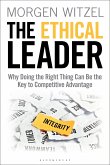There are now over 10,000 benefit corporations and public benefit corporations in the United States, including at least fifteen public companies. This is the authoritative guide for leaders, advisors, and board members. Entrepreneurs and leaders often have an inspiring vision for how their business can not only make money for shareholders, but also benefit society. In recent years a new legal structure has emerged, the "Benefit Corporation" or "Public Benefit Corporation," which helps organizations make this ethical vision a legally authorized and protected reality. Companies like Patagonia, Kickstarter, Warby Parker, Danone North America, Allbirds, and King Arthur Baking have become benefit corporations to help advance both their business and their broader mission. Rather than narrowly maximizing profits, they consider their businesses' impacts on employees, customers, suppliers, the environment and others. The goal of benefit corporations like these is to foster a new, more humane, and sustainable capitalism by pursuing both profits and mission. Benefit corporation status helps protect the company mission even when leadership changes-and in the face of pressure from investors, shareholders, bankers and lenders. Becoming a Public Benefit Corporation explains this exciting new type of corporation, when it makes sense, and how becoming a benefit corporation can help leaders and organizations balance the tradeoffs between profits and mission. Law professor and corporate governance expert Michael B. Dorff also covers the weaknesses of benefit corporations, arguing that the enforcement mechanisms around benefit corporations are currently too weak to prevent "purpose washing." With examples from top companies, the book shows mission-driven leaders, board members, and advisors how to use the benefit corporation structure to make the world a better place.
Hinweis: Dieser Artikel kann nur an eine deutsche Lieferadresse ausgeliefert werden.
Hinweis: Dieser Artikel kann nur an eine deutsche Lieferadresse ausgeliefert werden.








